Securing a company’s digital space immune to hackers is the primary focus these days as cyberattacks has increased by 47% in 2025. Cyberattacks are a major threat to organizations of any size. One of the strongest defenses against these threats is firewall security/ To save their networks from unethical breaches most businesses are spending enough on implementing advanced security solutions in the form of firewall security.
With a growing demand for safer networks, the firewall market is booming and is projected to reach 28.6 billion US dollars by 2031. This underlines the need the future holds in building strong cybersecurity measures. While you are looking to strengthen your organization’s security lane, you also need to know the strategies involved in protecting your network. This guide will break down the latest firewall security strategies, real-world best practices, and expert tips on keeping your network safe in 2025.
Table of Contents
ToggleWhat is Firewall security & How Does it Work?
Think of Firewall security as a high-tech defense system at your organization’s digital entrance; which is your network. The main concern is to protect your network from unwanted or harmful cyber related threats. It works by monitoring all the data flowing in and out of your network. This process follow a set of rules, where it blocks anything suspicious or unauthorized. It is more like a security gate where only trusted people can have access to the data or the sensitive elements.
Modern firewall network protections are a result of increased need for business’ cyber security. The security features include blocking harmful websites, preventing malware, protecting your apps and online transactions. In addition, they keep safe confidential data and systems from possible risks.
In 2023, a Fortune 500 company suffered a data breach due to an unpatched firewall vulnerability, leading to 3.5 million leaked records. This highlights why businesses must ensure their firewall security is up to date and properly configured.
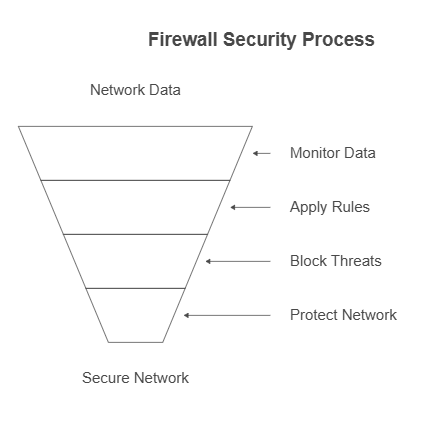
How Firewalls Block Cyber Threats & Prevent Attacks
Firewall security serves as a protective barrier against a wide range of cyber threats. These threats when left unscreened, turn against your company’s reputation. This firewall security solution manages various areas within a network and here is how the process is:
Blocks External Threats at the Entry Point
Firewalls is like a first line of defense by screening incoming and outgoing traffic. They filter data packets to detect if it has malicious elements and blocks before it enters the network. This basic function is the foundation for network security.
Prevents DDoS Attacks
When cyberattacks like Distributed Denial of Service (DDoS) grow actively, firewalls help control huge traffic.
To detect smaller attacks in the network, techniques like throttling and load balancing are practiced. Meanwhile, when it comes to complex attacks, firewalls work alongside advanced DDoS mitigation solutions to protect against bandwidth exhaustion.
Modern firewalls now integrate AI-powered DDoS mitigation tools that can predict and neutralize attacks before they reach critical infrastructure. These systems use machine learning to detect abnormal traffic patterns and automated rate-limiting to prevent service disruptions.

Defends Against Malware and Viruses
Firewalls strengthen malware protection by filtering suspicious packets. During such checks firewalls blocking known malicious IPs, and restricts breaches from unknown sources.
Also, with the use of tools like antivirus software, intrusion detection systems (IDS/IPS), and email filtering, firewalls create a layered defense against malware and viruses. This keeps each layer of network protected.
AI-powered firewalls leverage real-time behavioral analysis to detect zero-day threats. These systems continuously analyze network traffic, flag anomalies, and respond to unknown threats instantly—preventing sophisticated cyberattacks that traditional firewalls might miss.
Also Read: Essential API Security Testing Checklist for Secure Applications
Protect Internal Networks Through Segmentation
Organizations often divide their networks into smaller, secure segments. Firewalls oversee traffic flow between these segments, ensuring that sensitive data is transmitted safely and threats are contained within affected areas. This segmentation helps improve network management and security redundancies.
Safe Access Control
Firewalls enable strict boundaries using Access Control Lists (ACLs). These rules determine what traffic is allowed or denied following criteria like source, destination, and protocol. Advanced firewalls, like NGFWs, even inspect deeper layers of traffic, such as DNS requests or web content, for tighter security.
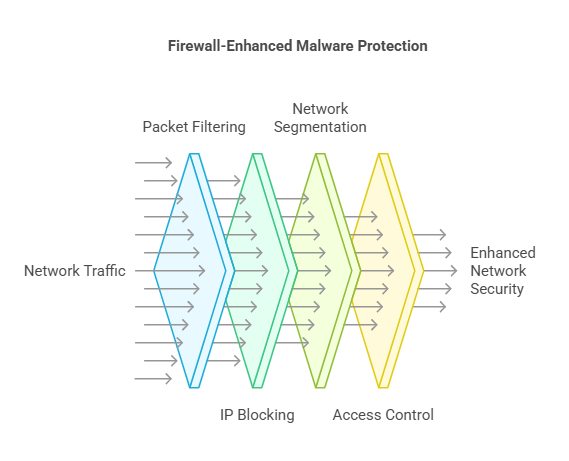
Secure Remote Connections via VPNs
Some companies work on VPN and to protect it they use firewall security. When an attack comes through incoming traffic firewall acts in filtering breaches and restricts it. Through this, potential data leaks from devices are monitored and blocked.
Inspects Encrypted Traffic
TLS is a security protocol that ensures privacy and data security for online communications. Firewalls with TLS inspection can decrypt encrypted traffic, check it for threats, and re-encrypt it before sending it on. This helps block malicious traffic, but it must be used cautiously to maintain the privacy of secure communications.
Deep Packet Inspection
DPI is commonly used in firewalls and security systems to identify and block viruses, malware, or intrusions. This Deep Packet Inspection examines and manages network traffic Here the DPI checks beyond the basic packet header screening. It works by inspecting the data inside packets. The content of the messages are monitored in real-time, and it decides whether to allow, block, or re-route them based on the preset rules.
Also Read: 6 Proven Strategies to Build a High-Performing Cybersecurity Team
Filters Content and Manages URLs
Firewalls help organizations maintain a safe and productive online environment by filtering web content and blocking harmful or inappropriate URLs. They observe company policies, prevent access to malicious sites, and redirect users trying to visit restricted pages.
Strengthens Internet-Based Operations
For businesses that depend on internet connectivity, firewalls allow smooth and secure operations. By inspecting and filtering data coming from the internet, they block unauthorized access and harmful traffic. The result is a secure digital environment for customers and employees.
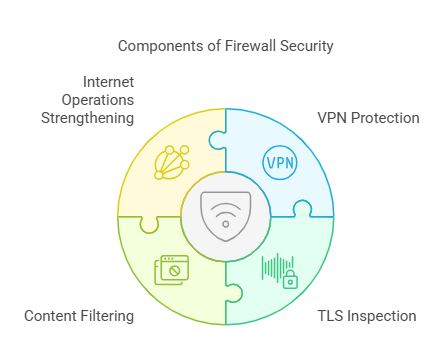
5 Proven Firewall Security Strategies for 2025
Firewalls use a variety of strategies based on different organizational needs to keep your data safe. Here are some of the key techniques firewalls use to create a strong defense for your system:
1. Traffic Filtering
Firewalls scans incoming and outgoing network traffic to decide which data should pass through and which should be blocked. This filtering process can be based on specific rules such as the source and destination of the traffic, IP addresses, and ports. Firewalls either allow or block traffic based on these preset rules to prevent unapproved access.
2. Intrusion Prevention and Detection
Firewalls actively look for signs of suspicious activity. They detect threats like malware, viruses, and other malicious activities by inspecting the traffic that comes through. If something looks harmful, the firewall can stop it before it can damage the network, ensuring that your system stays secure.
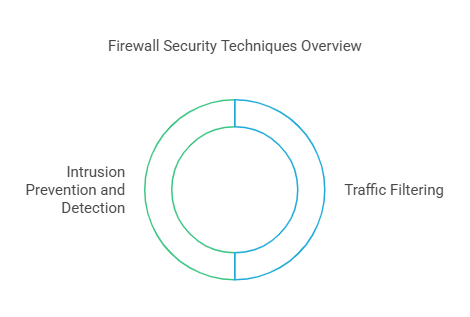
3. Application Layer Filtering
The firewall security that focus on application layer filtering (ALF) dig deeper in monitoring attacks. They examine the content of the data packets themselves—checking for potential vulnerabilities or threats hidden in things like emails, websites, and applications.
By filtering traffic at the application layer, firewalls can prevent attacks that target specific software or services, like SQL injection or web server attacks.
4. Access Control
Firewall security can limit the threat actor’s control of your network and what the attackers can do once they have network access. By setting up strict access control policies, firewalls can prevent impermissible users from accessing sensitive data.
They also allow businesses to define rules for which users or systems can communicate with each other, ensuring that only the right people have access to critical information.
5. DNS Filtering and Blocking Malicious URLs
Firewalls can also protect your network by controlling access to websites. With the use of DNS filtering its possible to block corrupt URLs or sites known for spreading malware, phishing attempts, or other dangerous content.
This filtering keeps users away from visiting harmful websites, making it safe to browse and reduces the risk of online attacks.
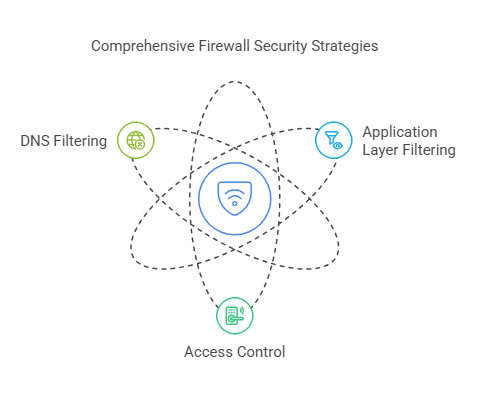
Firewall security acts like a barrier for monitoring and controlling network traffic. By blocking external threats at the entry points and providing safe access control, it’s indeed an all-rounder for guarding your network.
Ensuring firewall security requires employing robust security measures and also conducting regular security audits. The key objective is to identify and mitigate vulnerabilities and ultimately meet compliance requirements.
Enhancing Firewall Security The Wattlecorp Way
For Wattlecorp, undertaking firewall audit means ensuring proper firewall configuration and rules. This follows a comprehensive process with assessments and evaluations for both your hardware and software as an organisation.
Unless you do not configure them properly, you will not be able to secure your organisation from high-profile attacks, such as network infiltration. These may include DoS (Denial-of-Service) or unauthorised access.
Our team of expert cybersecurity professionals in the UAE work day in and out to ensure top-level firewall security for your business. From implementing firewall to preventing cyberattacks for you, we help ensure improved security posture for you.
Is your firewall security network giving you a pain in your neck? Reach out to us if strengthening it is your top priority. Remember it is something that will save your business from reputational loss that may occur due to data breach or any other security incident.
Schedule a firewall security audit with us and our team will contact you sooner than later for this purpose. Secure your network before attackers strike.
Firewall Security FAQs
1.How can firewall provide security to the system?
Firewalls block unauthorized access by screening and keeping control over the incoming and outgoing network traffic. This security protection also filters corrupt content, and enable security policies to act against cyber threats.
2.How does a firewall differ from antivirus or anti-malware software?
Antivirus software focus on detecting and removing harmful programs protecting individual files from the system. On the otherside, firewalls primarily control and filter network traffic. Firewall also secures the network perimeter from external threats.
3.How does firewall help in cybersecurity?
Firewalls mainly help in preventing unethical outsider access. It blocks harmful traffic, and stands as a barrier between the internal network and external threats. This way it reduces the risk of data breaches and cyberattacks.
4. What’s the difference between a Next-Gen Firewall (NGFW) and a Traditional Firewall?
A Next-Generation Firewall (NGFW) offers advanced security features like deep packet inspection, intrusion prevention, and application filtering, allowing better threat detection. Traditional firewalls focus on packet filtering and stateful inspection based on IP, port, and protocol, making them less effective against modern cyber threats.
5. Can AI-powered firewalls detect zero-day threats?
Yes, AI-powered firewalls detect zero-day threats by analyzing network behavior, identifying anomalies, and adapting to emerging attacks in real time. Unlike traditional firewalls, they use machine learning and threat intelligence to recognize and block unknown exploits.
6. How often should a business update its firewall configurations?
Businesses should update firewall configurations at least quarterly or whenever there are network changes, new threats, or compliance requirements. Regular audits and security patches help maintain optimal protection.
7. How to configure a firewall step by step?
Define security policies, change default credentials, enable intrusion prevention, and set up rules to control access based on IP, ports, and protocols. Secure remote access with VPN settings, enable logging for monitoring, and update configurations regularly to prevent new threats.
8. Can a firewall stop phishing attacks?
While firewalls can block malicious websites and filter harmful emails, they cannot completely stop phishing attacks. A next-generation firewall (NGFW) with DNS filtering and AI-driven threat intelligence can help detect phishing attempts, but user awareness and email security measures are also essential.
9. How can businesses test if their firewall is effective?
Businesses can test their firewall effectiveness through penetration testing, vulnerability scanning, and network traffic analysis. Regular firewall audits and simulated cyberattack scenarios help identify weaknesses and ensure security policies are working correctly.
10. Why do firewalls sometimes block legitimate traffic?
Firewalls may block legitimate traffic due to overly strict rules, outdated security policies, or false positives from intrusion detection systems. Fine-tuning access control lists (ACLs), monitoring firewall logs, and adjusting security policies can help reduce unnecessary blocks.







